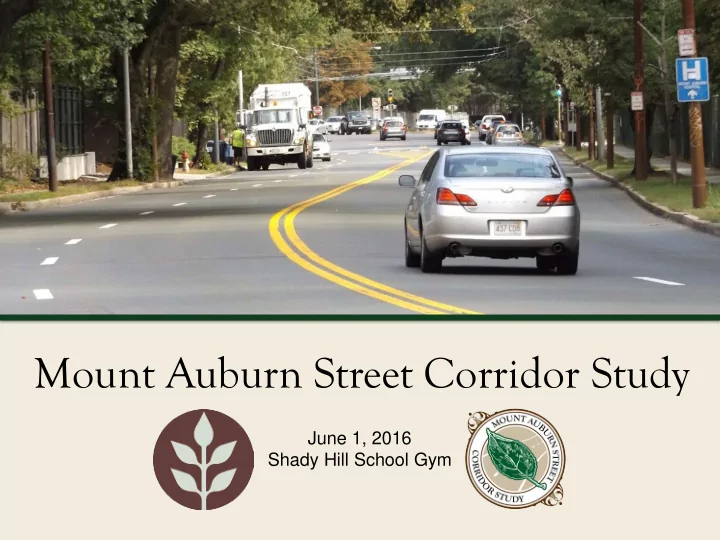

Mount Auburn Street Corridor Study June 1, 2016 Shady Hill School Gym
Commonwealth of Massachusetts Governor Charles D. Baker Lieutenant Governor Karyn E. Polito Energy and Environmental Secretary Matthew A. Beaton Department of Conservation and Recreation Commissioner Leo P. Roy Mount Auburn Street Corridor Study
DCR Mission Statement To protect, promote and enhance our common wealth of natural, cultural and recreational resources for the well-being of all. Mount Auburn Street Corridor Study
Agenda • Team Introductions • Project Timeline • Public Process Overview • Stakeholder Group Formation • Quick History Lesson • Previous & Current Planning Work • Work Accomplished So Far • Existing Conditions: Break Out Sessions • Next Steps Mount Auburn Street Corridor Study
Introductions • DCR Team • Consultant Team • Facilitators • Stakeholder Group Members and Affiliation Mount Auburn Street Corridor Study
Schedule Mount Auburn Street Corridor Study
Public Process Overview • Public Meetings: allow the public at large an opportunity to voice their ideas and concerns as the study progresses • Stakeholder Group: meeting monthly to advise DCR on neighborhood’s goals and desires. • Wikimap: a means for feedback from folks that can’t attend meetings • DCR balances your input with: – Environmental Review – Historic status – Funding Requirements – Regional Needs • More Productive = More Influence Mount Auburn Street Corridor Study
Stakeholder Group Formation Mount Auburn Street Corridor Study
Super Quick History Mount Auburn Street Corridor Study
Local Area Projects Mount Auburn Street Corridor Study
Previous and Current Planning Work Mount Auburn Street Corridor Study
Charles River Connectivity Study (2014) Mount Auburn Street Corridor Study
Cambridge Riverfront Plan (2011) Mount Auburn Street Corridor Study
Lowell Park Cultural Landscape Report (2014) Mount Auburn Street Corridor Study
MBTA Key Bus Route Improvement Program (2013) • Lengthens bus stops to 100’. • Slight sign relocation for WB stop at Aberdeen. • Does not address delays from bus pullouts. • Cites legal mandate to open bus doors at curb. Mount Auburn Street Corridor Study
Cambridge Transit Strategic Plan (Interim 2014) • 71 Bus fails the MBTA’s “Vehicle Load Standard” (excessive crowding at peak). • Goal 3: Make transit travel times equal to or quicker than driving travel times. • Calls for bus-priority pilot projects and signal progression. Mount Auburn Street Corridor Study
Cambridge Bicycle Plan (2015) Mount Auburn Street Corridor Study
Strawberry Hill Neighborhood Plan (2007 update) • Identifies Belmont and Holworthy intersection as a “gateway” that needs to be made “more attractive.” • Requests improved signal timing for pedestrians at Belmont and Mount Auburn intersection. Mount Auburn Street Corridor Study
Watertown Bicycle Transportation Plan (2003) • Recommends 4-2 Road Diet for Mount Auburn Street to add bikeways. Mount Auburn Street Corridor Study
Watertown Comprehensive Plan (2013) Mount Auburn Street Corridor Study
Highway Safety Imp. Program Crash Clusters (2011-13) Mount Auburn Street Corridor Study
Streetscore Visually Perceived Safety Map (2016) Mount Auburn Street Corridor Study
What’s Happened So Far: • Walk Through with DCR staff, Municipalities, MBTA - April • Kick-Off Stakeholder Group Meeting – May • Existing Conditions Inventory – Ongoing • Wikimap live and gathering feedback Mount Auburn Street Corridor Study
Walk Through Highlights – April 14, 2016 • Challenging bike maneuvers at Belmont, Brattle • Illegal left turns into Star Market Parking Lot. • Opportunities for place-making near Star Market and at Brattle. • Danger for peds and bikes at Fresh Pond Parkway. Signal Cycle and geometry of intersection are inefficient, which is creating bus delay. • Poor sidewalk conditions in several areas. • BB&N student pickup creates high afternoon parking demand and some congestion. Large numbers of students are crossing Fresh Pond and facing significant delays. Mount Auburn Street Corridor Study
Web Mapping Tool http://wikimapping.com/wikimap/mtauburn.html Mount Auburn Street Corridor Study
Breakout Sessions Goals: • Identify problems. • Capture your ideas. Topic areas: • Walking/ADA • Bicycling • Transit • Driving • Neighborhood Environment and Local Businesses Mount Auburn Street Corridor Study
Key Themes We’ve Heard So Far: • Improved safety for all modes • Both short term (low cost) fixes and long term projects • Improved transit operation through the corridor • Improved bike and pedestrian infrastructure, connecting neighborhoods, regional institutions, and the Charles River • Calm, predictable traffic to reduce neighborhood cut through and cyclist and pedestrian stress and increase motorist compliance • Increased clarity for all modes • Increased local business accessibility • Opportunities for place-making • We want more details! Mount Auburn Street Corridor Study
Next Steps • Next Stakeholder Group Meeting – Late June/Early July – Discussion of shared goals, and potential feasibility of road diets – All are welcome, but space is limited • Initial Conditions Report – August • Next Public Meeting – October – Discussion of proposed long and short term improvements Mount Auburn Street Corridor Study
For More Information • For m ore inform ation: – www.mass.gov/dcr/mt-auburn-corridor-study • I f you have com m ents or suggestions on this project: – Submit online: – http: / / www.mass.gov/ eea/ agencies/ dcr/ public-outreach/ subm it-public- comments/ – Write: Department of Conservation and Recreation Office of Public Outreach 251 Causeway Street, Suite 600 Boston, MA 02114 – Deadline (pertaining to this meeting): Wednesday, 6/ 15/ 16 • Note: Public comments submitted to DCR may be posted on the DCR website in their entirety. – Project Wikimap: www.wikimapping.com/wikimap/mtauburn.html – If you have questions, please email: MaryCatherine.McLean@massmail.state.ma.us Mount Auburn Street Corridor Study
Recommend
More recommend